Students have always come first at Central, and it was the pandemic’s impact on students that was first on the minds of the entire community. All students, except a few who had an urgent and compelling health or welfare reason to remain on campus, were sent home for their safety at the start of spring break in March. Break was extended from one week to two weeks; faculty used the extra time to prepare for remote teaching and learning for the remainder of the semester.
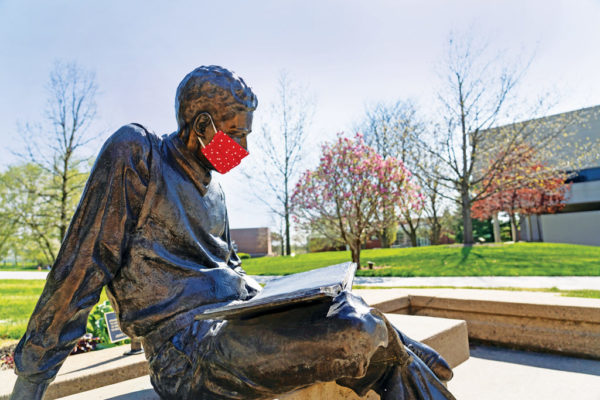
A thoughtful Central community member fitted The Quest, Central’s bronze likeness of Harold Geisler, with a mask while studying and practicing physical distancing on the Peace Mall.
All in-person classes and events for the second half of the spring semester were canceled — a move ultimately made by nearly every institution of higher learning in the country. Athletics seasons went incomplete. Study abroad programs, internships, research and community service projects all were affected. The result hit the Class of 2020 particularly hard: Goodbyes with classmates, faculty and staff were hasty or impossible and the much-anticipated Commencement ceremony was put on hold.
The college quickly adapted. Central pivoted to remote teaching and learning, invented new ways to serve and support students and accelerated campus improvement projects. It’s been a challenge, yet academic progress hasn’t missed a beat. Enrollment numbers and donations have set records. And Central students and alumni are pitching in — some in life-altering ways — to serve their communities and save lives.
Here’s an overview as of late August 2020 when this issue of the magazine went into production. Quoted passages have been edited slightly for style and space.
ACADEMICS
When coronavirus hit, Mary E.M. Strey, Central’s vice president for academic affairs and dean of the faculty, had two priorities:
- Make sure students’ academic progress continued unimpeded and
- Ensure they did not lose financial aid.
That meant providing nearly every student with a full course load — wherever they happened to live.
“I have to tell you, it was phenomenal,” Strey says. Starting during the extended two-week spring break, “faculty organized and hosted distance-teaching workshops for each other so those who were experts could help teach others. Information Technology Services provided all the equipment we needed on campus and hand-delivered, in many cases, technology to students: laptops, personal Wi-Fi hot spots, microphones, whatever they needed to participate.” ITS also made sure faculty and students had access to the software and platforms they needed to communicate and collaborate.
As courses continued remotely, faculty and students “extended grace in both directions.” Faculty voted to allow students to elect to have their course graded on a pass/ no-credit basis and offered students flexibility in reaching academic objectives. Students were patient with professors who were teaching remotely, many for the first time.
Other academic activities continued in altered form: Honors students shared their senior honors thesis to the Central community remotely and the annual celebration of faculty accomplishments and announcements of awards also took place virtually. “There was great participation because folks were so eager to be connected,” Strey says.
“Students and faculty really missed each other.”
— Mary E.M. Strey, Vice President for Academic Affairs and Dean of the Faculty
At the end of the spring semester, a group of faculty surveyed students for the results. The consensus: “We found that synchronous education — everyone participating in real time — worked better than online learning, where everyone worked individually. But nothing was as good as face-to-face,” Strey says. “Students and faculty really missed each other.”
Still, there was an upside: “Some faculty found ways to revise some aspects of their face-to-face teaching to make it even better,” Strey says.
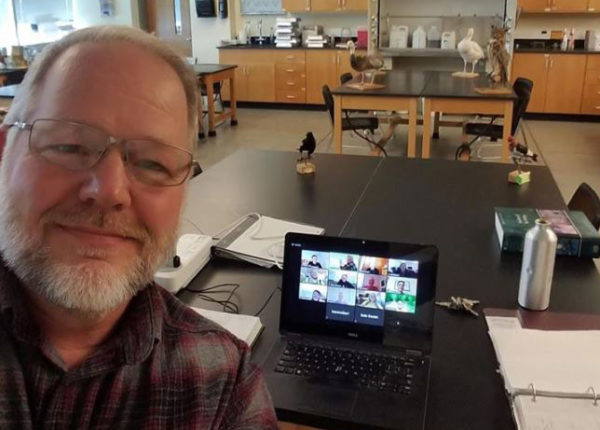
Flocking to class: Professor of Biology Russ Benedict missed having students physically present to watch his lab demonstrations during remote learning. So he invited the department’s collection of stuffed bird specimens to sit in for them during his Zoom ornithology teaching sessions.
There was no letup during summer: Facilities management went through the campus room by room to determine what the new capacities of each space are when incorporating 6-foot physical distancing; fall courses were reassigned rooms accordingly. And faculty continued to engage in professional development to help them teach in person while at the same time allowing any students who may need to be in quarantine to participate remotely in real time.
Fall saw other adaptations as well: Due to the danger of spreading infection while singing and playing instruments, there are no live concerts during the first semester of the 2020-21 academic year, though the college planned to livestream student recitals.
The result is increased resilience. “We take with us the wisdom of experience,” says Brian Peterson, associate dean for curriculum and faculty development. “We learned that in an emergency, we can teach remotely and still maintain the quality education we are known for. We now understand how to keep functioning during an emergency that might otherwise shut us down.”
OFF-CAMPUS STUDY AND CIVIC ENGAGEMENT
Central prides itself on how much of its programming takes place out in the world. Off-campus study, internships and community service are integral to a Central education both as stand-alone and course-embedded experiences.
COVID-19 threw a wrench in all of them.
One of the most fraught aspects of Central’s experience with the coronavirus — and some of its greatest triumphs — came as the college worked to preserve as much educational continuity amid the chaos as possible for each student. That effort was a collaboration between the study abroad, registrar’s, career development and civic engagement offices.
First, students studying off campus had to return from their host locations before borders closed — no easy feat when flights were filling and canceling by the minute. With lots of above-and-beyond work from the Central did, and most could continue to accommodate Central students’ continued participation. For those that could not, alternative courses taught remotely from Central’s campus were found or developed, or professors took on one-on-one independent studies with students.
Next came the issue of internships and community service experiences. Many — even though based in other countries — were able to continue as virtual experiences. “We had students doing research for an organization in Vienna from their homes in the United States,” Peterson says.
Some experiences, such as those working with vulnerable youth or in long-term care, were unable to safely continue. For students involved in those, Assistant Dean for Career Development and Civic Engagement Jess Klyn de Novelo ’05 and the community-based learning team contacted the college’s long list of internship and community partner organizations and alumni for alternatives. Other students satisfied requirements by completing a career-related remote course developed by the college. Klyn de Novelo also worked through the Pella Area Community and Economic Alliance to encourage local businesses to post short-term professional projects students could complete for them — a sort of gig-economy-meets-internship space. Several did.
There were some unexpected benefits: Most students found they adapted quickly to remote work. And several employers realized they could offer more flexible internship arrangements than they’d previously realized.
COVID-19 SUMMER CLASS
To keep engagement high during the summer, Central offered An Interdisciplinary Conversation on COVID-19. This free, 11-week, two-credit remote learning opportunity was offered in versions for incoming first-year students and for returning students. Both courses began the week of May 25 and continued into the first week of August. Nineteen faculty from 12 departments and three academic areas taught the classes; more than 200 students enrolled.
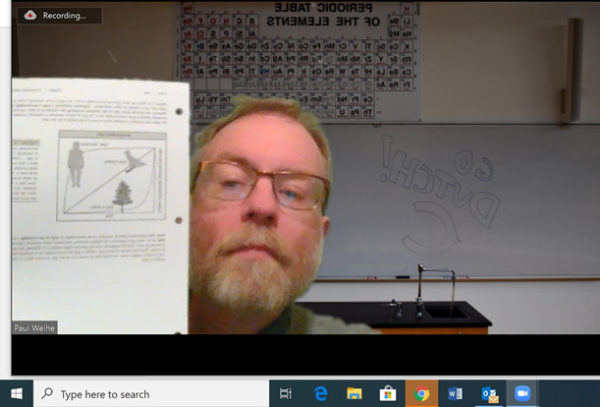
Paul Weihe, associate professor of biology, leads a class session using Zoom.
“It gave faculty an opportunity to work with students on a topic they may otherwise only have touched on tangentially, and for students to work with a faculty member they may not have been able to while on campus. For incoming first-year students, it was a chance to introduce them to our exceptional faculty and to begin to build a community,” Peterson says.
“Everything we’ve seen in the media about the pandemic is a part of interdisciplinary analysis,” Peterson continues. “How do we communicate about it, with what metaphors? How does it relate biologically and historically to SARS and other pandemics? What are the ethical implications, and what have been the artistic responses? This course gets students to realize this is something to view from many different angles in order to truly understand what’s going on.”
STUDENT DEVELOPMENT
Student development at Central incorporates much of the programming for students outside the classroom: campus activities; campus ministries; residence life; work-based learning; wellness, safety and counseling; and pre-college programming.
Vice President for Student Development Carol Williamson added another responsibility to her many roles in March: relocation coordinator. Charged with helping more than 1,000 students vacate the campus on short notice, “We stored items, shipped items — a staff member was on the phone in a student’s residence hall room while the student was telling him where to find their chemistry notes,” she remembers. “I still have a student’s bike in my garage.” Many of her staff did the same. Individual requests were honored.
Somehow, it all worked. By the second half of spring semester, there were less than a dozen students on campus for whom that was the best place to be. The college arranged cleaning and meal delivery service for them so they could safely stay.
Then her team helped the financial aid and treasurer’s offices refund pro-rated room and board fees. They also established a Central Cares Fund to help students meet COVID-19-related expenses and administered Federal CARES Act funds to provide emergency financial aid grants to students whose lives were disrupted by COVID-19.
“I cannot overemphasize the need for vigilance. Never has the continued health of the college, the Central community and, indeed, of our state and nation been more directly dependent on the day-to-day choices made by each one of us.”
— President Mark Putnam, July 24, 2020
Throughout the spring, student development continued to offer events and services to students remotely through residence hall virtual programs and the counseling center. It continued Central’s long-standing Upward Bound and PreCollege programs for school-aged children entirely virtually.
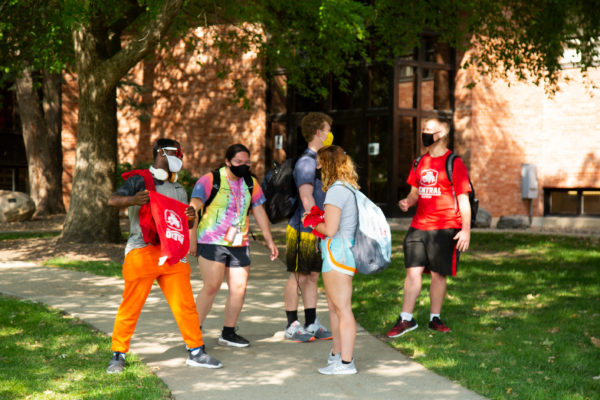
Central hosted the inaugural Forever Dutch celebration for faculty, staff and students to celebrate being back together on campus.
Concurrently, the team began planning for the fall. They innovated ways to continue Central’s tradition of experience-rich residential life and extracurricular options, many in new, pandemic-safe ways.
“Our work is to prepare students to be healthy and to encourage them not to lose sight of their dreams,” Williamson says. “We’ve kicked off the semester with a new, outdoor Forever Dutch® event for the whole campus community. All the cautions were taken, and we celebrated everyone being back together.”
Behind the scenes, student development has built on the college’s already strong relationships with Pella Regional Health Center and Marion County Public Health. They’re working closely with both to monitor and respond to ongoing conditions and to make sure Central students get the health care they need.
ADMISSION
Recruiting an incoming class during the most uncertain times in a century posed a host of challenges. Chief among them: how to maintain the personal touch Central is known for while the world was in lockdown.
Before lockdown, the admission team visited all 377 high schools in Iowa. After COVID-19 hit, Dean of Enrollment Management Chevy Freiburger and his admission team upped their phone, email, text and digital contacts with prospective students, worked with Central’s communications team to create a video tour and scheduled one-on-one and group video chats with high school students and families.
A virtual tour, given by Madeline DeLeon ’20, helped keep prospective students interested in Central when on-campus visits weren’t possible.
“In March, we had to flip on a dime,” Freiburger says. “We had to regroup and go 100% virtual. We were really excited about the ability to adapt and keep the ship moving.
“It goes back to the product of Central, the affordability and the value you receive here,” he says, emphasizing the tuition price of $18,600 announced in September 2019. “Students and families saw that.”
Meanwhile, Director of Financial Aid Wayne Dille and the admission office made it clear Central considered the needs of applicants whose family financial situation had been hurt by the pandemic. In-person tours restarted June 1 and visitor attendance topped past years by a wide margin.
As a result, 325 first-year students and 31 transfer students joined the Central community for the fall semester.
DEVELOPMENT
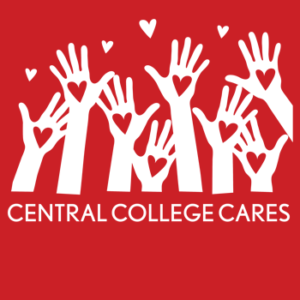
In spite of the pandemic, Central enjoyed another record-breaking year in its fundraising efforts for the Journey Scholarship Fund and saw tremendous overall support for the fiscal year ending June 30, 2020.
More than 4,000 alumni and friends donated $5.67 million, an increase of more than 20% giving rom the previous fiscal year. Central also saw an increase in participation with more total donors than the previous year.
A record $1.38 million went toward the Journey Scholarship Fund. The college’s 48-Hour Challenge, held in August 2020, by itself raised more than $185,000 for the fund, surpassing its goal. This year, more than 700 students received a Journey Scholarship thanks to generous donors. At Central, 100% of gifts to the Journey Scholarship Fund directly support students.
The college also established the Central Cares Fund to help students demonstrating need for emergency assistance due to changes in economic or health conditions because of the coronavirus pandemic.
It also was a significant year for the Forever Dutch® initiative as renovation work began on the lower level of P.H. Kuyper Gymnasium and most of it was finished in August 2020. Some of the funding momentum included a 48-Hour Challenge in August 2019 that raised $291,588, surpassing its goal of $220,000. It included gifts from 328 friends and alumni.
“We are so grateful to our donors for helping continue the tradition of giving that allows current and future students to have access to a Central education. Philanthropy helps underwrite every aspect of our mission,” says Sunny Gonzales Eighmy ’99, vice president for advancement. “We are so incredibly fortunate to have donors — alumni, friends and foundations — who are committed to this amazing institution.”
FACILITIES
Central’s cleaning crew always has gone above and beyond. But as a precautionary measure, the 50 employees who make up Central’s facilities department adjusted cleaning protocols following recommendations by the Centers for Disease Control and Prevention.
“Facilities management custodial staff increased cleaning frequencies in high-traffic areas such as Maytag Student Center and Central Hall to keep these areas as clean and germ-free as possible,” says Craig Roose, director of facilities maintenance. “In addition, we spent the summer deep cleaning academic and residential areas.”
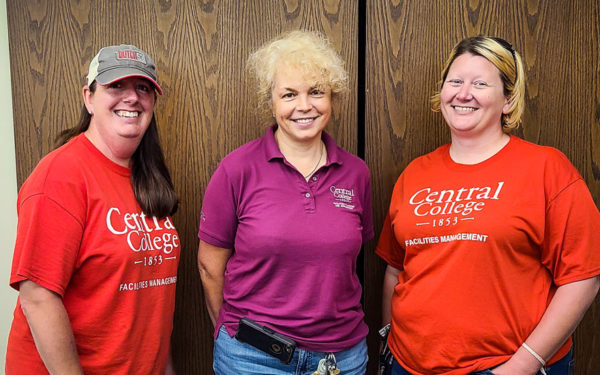
Kim Roorda, Olga Saoutina-Crumes and Trisha Van Wyk are three of Central’s facilities staff following new cleaning protocols to help keep the campus as germ-free as possible.
In residence hall rooms, they clean everything from toilets to showers while restocking toilet paper and emptying trash. They thoroughly clean classrooms, including desks and tables. They make the gym floor shine. They make common areas the perfect place to relax or study.
It’s all about the students, says Kim Roorda, custodian and team leader. “We want them to come here and we’ll take care of them.”
Her colleague Trisha Van Wyk agrees. “Pella is a clean community and Central wants to share in that.”
There was also a bit of a silver lining to the students temporarily leaving campus in March: The college had planned to wait until summer to begin some parts of the Forever Dutch Phase Two update to the P.H. Kuyper Gymnasium to avoid interfering with athletics activities. But with students off campus, they were able to accelerate the schedule of renovations to the athletics training room and coaches offices. Facilities also used the time to finish renovating shop space at its warehouse.
STUDENTS
A Whirlwind of Emotions
“Every day I watched the Spanish news with my host mom, Encarna, as the news got worse. Veronica Garcia Montero, our Granada, Spain, study abroad program director, drilled us on safety, protocols and travel restrictions. Suddenly EVERYBODY was talking about the coronavirus.
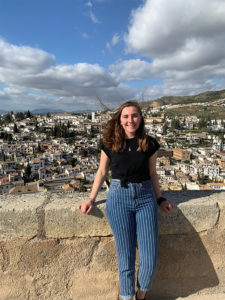
Rylie Conway ’21 was studying in Spain when
the coronavirus hit and brought her and her
fellow study abroad students back to the United
States in March.
On March 13 our program was suspended and we learned we must go home as soon as possible. I was relieved but mortified. I wanted to be home, but I didn’t want to leave. I rushed to buy the earliest, most direct flight to the United States, and left three days later. During those days, the virus made unbelievable progress in Spain. The president announced a nationwide State of Alarm — it was illegal to leave your home except to buy groceries or medicine, or to work. For two days, I sat inside in fear and sadness. I was terrified of what this virus could do, and even more terrified of having to travel home. It was extremely difficult, but I made it through customs and Centers for Disease Control and Prevention screening and was free to go — but not home. I still had to quarantine for two weeks — fortunately, with fellow Central student in the Granada program Katie Huhe ’21 in her sister’s apartment about two hours from my house. (Huhe’s parents had Huhe’s car at the airport filled with ‘gas and groceries and all the essentials.’) I had plenty of time to reflect on how grateful I was for the time I did have in Spain. It was whirlwind of emotions, but I wouldn’t trade it for the world.”
— Rylie Conway ’21
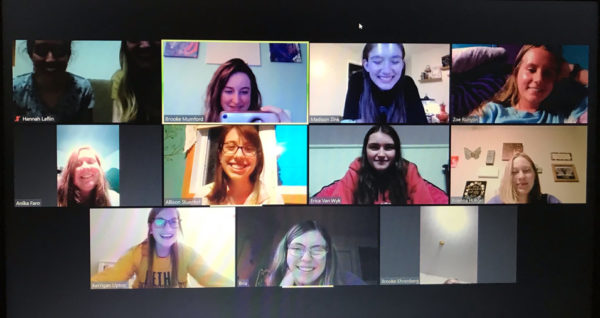
It Doesn’t Matter That We’re Separated
“The sudden ending of the school year made me realize just how much I loved college. My Bible study that Campus Ministries started is still in touch despite the distance between us all. Here is a pic of us all at our first meeting! It doesn’t matter that we’re separated by states when we were already such close friends.”
— Madison Zink ’23
The World’s Health Is More Important
Kiki Pingel ’21 was a member of the Central women’s track team in March when she was interviewed by the Pella Chronicle: “We had a few athletes in North Carolina ready to compete at the DIII National Indoor Meet, when the season was called off … it was a crazy few days. Multiple sources had us wondering if this was an overreaction. How could this be affecting a small DIII school like Central College in Pella, Iowa? At times you really wondered what was real. No school, no practices and no meets all of a sudden.
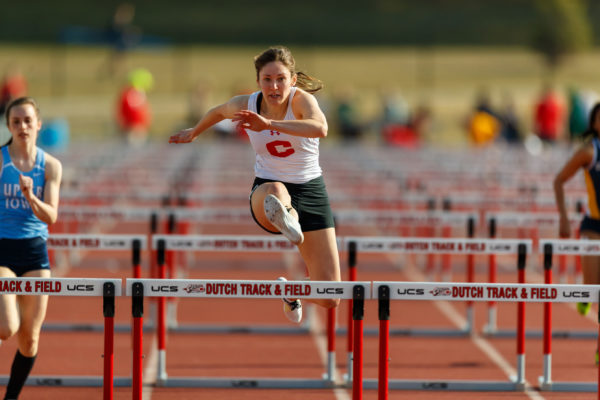
“My heart went out to the seniors on our team. Everyone is doing their best to adjust. … Track will end in four years; it is the least to be worried about. School is not over. We need to stay on top of our education. This virus is bigger than all of that. The world’s health is more important.”
— Kiki Pingel ’21
Student Mask Makers
Leighia Van Dam ’22 and Lexi Engen ’21, below left, decided to make good use of their time making masks while quarantining in Cedar Rapids after returning from Central’s Mérida, Mexico, study abroad program.
Sharaden Boggs ’23, below right, also in Cedar Rapids, made and donated with her sister 120 face masks to the college and many more for area hospitals, friends and family.
FACULTY AND STAFF
Getting Creative
“We’ve had to get creative during quarantine! Our students missed spending time in the chapel, so we hosted an attic-cleaning Zoom call! We found some unique treasures and caught up with our students.”
— Brooke Ehrenberg ’19, campus ministry coordinator
Learning by Doing
“I couldn’t be more blessed to work with our teacher education colleagues. I LOVE our students! I have received several messages of encouragement from students in my courses. Their messages of thoughtfulness and prayer support are amazing! This experience is truly ‘learning by doing.’ It’s challenging. It’s uncomfortable, at times. I’m becoming a better professional by learning to navigate teaching/learning in a different way. Learning is messy and it’s a great opportunity to grow — even when it’s uncomfortable.”
— Julianne Taylor, lecturer of education
A Live-Music Lift
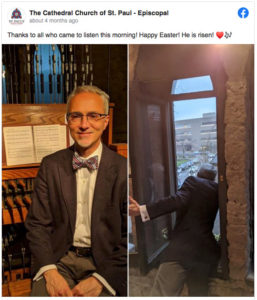 With churches mostly empty and most services online on Easter, people needed a live-music lift. Mark Babcock ’91, M. Joan Kuyper Farver Endowed Chair in Music and associate professor of music and director of choirs, played a 30-minute carillon concert Easter morning at St. Paul’s Episcopal Cathedral in Des Moines, Iowa, where he also is choirmaster and organist. “It was a unique idea this year, trying to find ways to give people sights and sounds that would connect them to meaningful memories of the past,” Babcock says. He had learned to play the carillon while on sabbatical. “It was a great project since we have one here at the cathedral, and organists are often carillonneurs,” he says. The carillon’s 25 bells rang through the streets of downtown, where hundreds of people were listening in their cars. There were 30,000 online viewers, and two Des Moines TV channels and Iowa Public Radio featured the event.
With churches mostly empty and most services online on Easter, people needed a live-music lift. Mark Babcock ’91, M. Joan Kuyper Farver Endowed Chair in Music and associate professor of music and director of choirs, played a 30-minute carillon concert Easter morning at St. Paul’s Episcopal Cathedral in Des Moines, Iowa, where he also is choirmaster and organist. “It was a unique idea this year, trying to find ways to give people sights and sounds that would connect them to meaningful memories of the past,” Babcock says. He had learned to play the carillon while on sabbatical. “It was a great project since we have one here at the cathedral, and organists are often carillonneurs,” he says. The carillon’s 25 bells rang through the streets of downtown, where hundreds of people were listening in their cars. There were 30,000 online viewers, and two Des Moines TV channels and Iowa Public Radio featured the event.
Professor of Music Ian Moschenross played a virtual piano recital June 10 to share some of his classical favorites with the Central community. He encouraged his 281 listeners to consider donating to the Central Cares Fund during the live concert.
Epidemiology Gets Real
“I taught two sections of epidemiology. Each week we met via Zoom to discuss a topic related to the pandemic that applies what we have learned. Topics include the eradication of smallpox, monitoring systems designed to prevent pandemics, testing, social distancing, globalization, human impact on the environment, how all of these are related to the pandemic and what we need to do to reduce the likelihood of a future pandemic of this scale. While none of us wants to be a part of this pandemic, it has provided me with an opportunity to put what we learn in epidemiology into practice. Students can relate to the subject as we are all affected and they can better understand the process, the confusion, the need for mitigation and the roles each person plays in this process.”
— Ellen DuPré, professor of biology
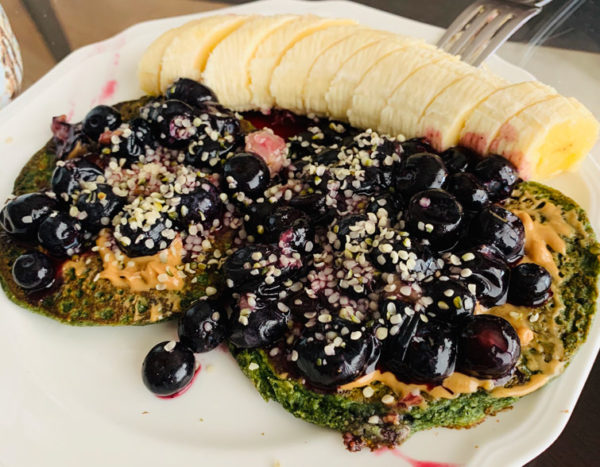
Eating Healthy in Quarantine
“I try to stay in contact with students and I sent them my healthy food pictures. Here’s one of my spinach pancakes, along with the recipe. 1 cup oats – blend 1 banana 1 cup spinach 1 cup water or any nut milk – blend Add 1/3 cup oats Make waffles or pancakes You can also add 1 scoop of vanilla plant-based protein powder, spirulina or hemp seeds.”
— Sara Shuger Fox, associate professor of exercise science
The Show Must Go On
Assistant Professor of English Kate Nesbit created two videos for her students that take a creative alternative to pedagogy. In “The Great British Writing Show,” (a spinoff of “The Great British Baking Show”) shot in her kitchen, she shares the recipe for an effective introductory paragraph for her English 160: The Literary Imagination course — complete with outrageous English accent and lots of foodstuffs for props. In “Blog Dissection,” (a play on frog dissection) she dons a lab coat, goggles and gloves to deconstruct two “species” of blogs for students in English 344: Writing for Nonprofit Organizations. She slices through the headline and into the body of a blog printout with scissors to reveal what it’s made of. “Here we have a hyperlink!” she exclaims, holding up a bit of text with tweezers.
The Economy Will Come Back
Economist and Associate Dean for Curriculum and Faculty Development Brian Peterson was interviewed by KNIA/KRLS radio about the pandemic economy in June. “The effects of COVID-19 will be fairly long-lasting,” he predicts. “At some point at the end of the year or into next year, you’ll see positive gross domestic product growth, but nothing close to where we were for quite some time,” he adds. For investors, “Ride it out is good advice,” he says. “Don’t look at your quarterly report as long as you have a long time horizon. As long as we plan on a long recovery, we’ll be OK.”
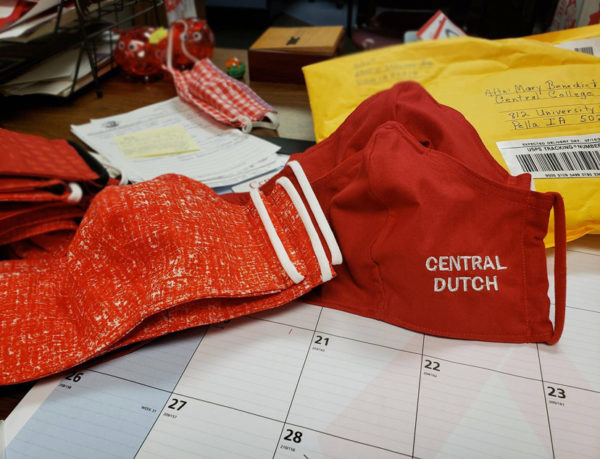
Packages of donated, handmade masks cover the desk of Mary Benedict, Central’s assistant director of alumni relations.
ALUMNI
Dozens of volunteers made and sent more than 1,000 pieces of protective equipment for Central students, faculty and staff — mostly masks and face shields — and many in Central colors or with Central logos. Those volunteers included more than 30 students and their friends, siblings, parents, grandparents and other relatives; Central alumni and their spouses; Central employees and retirees; college neighbors and Pella residents — even parents of students who attended Central summer camps. In total, volunteers sewed more than enough masks to allow the college to give one hand-made-with-love mask to each Central student. Each mask came with a tag identifying the mask maker. It all goes to show that there’s no such thing as a tenuous connection to Central!
Doing Everything We Can
“I work as the health and fitness director at a senior living facility outside of St. Louis, Missouri. With COVID-19 having the most dramatic impact to our senior population, we are doing everything we can to keep them safe during this time. Every hour we have something new for them to do. From sit-andchat to exercise to karaoke for happy hour, we do what we can to put smiles on their faces. My role in helping our seniors in the time of need is important. Staying active is one of the most important things a person can do. Being able to provide them with the materials and knowledge of exercise and its importance is why I love what I do. I feel like I can be a light for the residents and a smiling face they can see every day.”
— Daniel Weir ’18
The Way We Respond Has Drastically Changed
“My wife is a flight nurse for Airlift Northwest based out of Yakima, Washington. I’m a firefighter/AEMT for the City of Pasco, Washington. My department has treated a fair share of patients who present with coronavirus symptoms. My wife flies these patients from the hospital to high levels of care. We also still respond to the ‘normal’ calls that we face every day — fires, car accidents, EMS calls. But the way we respond to these calls has drastically changed with the presumption that every patient is infected until proven otherwise. Thankfully, we both work for progressive departments and are equipped and trained to handle these issues.”
— Derek ’09 and Kate Knutson
Jumping in With Both Feet
“Here in Michigan, we have been jumping in with both feet as teachers to figure out how to do remote learning. We have been learning how to run Zoom meetings and using Google Classroom, Quizizz, BrainPOP and Khan Academy to help deliver assignments, instructional videos and assessments. The learning curve is high. Parents have been great, but there is a wide variety of available technology. So, there have also been many packets of materials that have been delivered and paper/pencil task alternatives. To top it all off, I had just announced in February that I will be retiring at the end of the year. Never could I have imagined that I would not have these final months with my students to savor my ‘lasts’ with them. (We also have a high school senior who is missing out on the end of his year.) We are doing our best to maintain a new normal and trusting that God will see us through.”
— Jan Damsteegt DeJong ’86
Consider an Advanced Directive
“I am a palliative care physician at St. Patrick Hospital in Missoula, Montana. I am helping patients and their families with the hardest decisions during this pandemic, both in person and through telemedicine. Palliative care helps patients get the care they want while avoiding care they do not want. We’re often termed the “quality of life team” due to our focus on helping people live more comfortably. I also help patients with symptoms such as anxiety or symptoms from COVID-19 directly. Please consider completing an advance directive, also known as a living will, during this time at home. It will protect your wishes and guide your family if you are unable to voice your opinion while sick. I hope you all stay safe during this time.
— Nick J. Furlong ’00, M.D.
Being Good Neighbors
“We are delivering meals under the Meals on Wheels program. Every Sunday at 1:30 p.m., people in our neighborhood come out and greet neighbors. Some walk up and down the street to chat, keeping the recommended distance. If we have to run to the grocery store or pharmacy, we send out a round-robin email to neighbors asking if they need anything.”
— Robert Morley ’57
Michael Hicks ’83 is general manager at Andresen Digital, an imaging and graphics company in San Francisco, California. The sign and graphics business ground nearly to a halt during the pandemic until a university hospital asked if the company could make face shields. His wife, Lisa, says, “We have sourced as much material as we can and are making about 1,500 a day. Other hospitals are asking as well. We won’t make any money, but we will be able to put some employees back to work and help some of those on the front lines.” Hicks arranged for Andresen to manufacture, donate and ship 500 face shields to Central for which the college is extremely grateful.
From Athletic Training to X-Ray
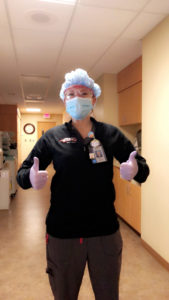
Amanda Higgins Giesking ’14
“I’m currently representing Central in Blue Earth, Minnesota. Athletic training at the high school is postponed so I’m working on the front lines of this crazy virus going around as an X-ray technician and an EMT on our local ambulance.”
— Amanda Higgins Giesking ’14
A TIMELINE
From Pella to COVID-19 and Back
The pandemic evolved rapidly and so did Central’s plans and operations. Frequent, sometimes daily, communications from President Mark Putnam to the Central community charted the college’s course. Here’s a summary of announcements and events.
For the full narrative: central.edu/health/covid19-archive and central.edu/health.
March 11:
Study abroad may be affected; spring break travel discouraged.
March 12:
Spring break extended one week.
March 16:
Remote learning to begin March 30; students to get pro-rated room/board refund.
Students move off campus, college events canceled, Commencement postponed.
March 17:
Iowa Gov. Kim Reynolds declares public health disaster emergency.
March 19
Temporary staff alternative work assignments allow some to work from home.
March 20
Out-of-state travelers to self-isolate.
March 30
Summer off-campus study canceled. Spring semester resumes; remote learning begins.
April 6
Virtual visit days begin.
April 7
Hoo-Rah Day gets 70,000-plus social media hits; raises a record $225,272.
April 13
Fall off-campus study in Austria, Spain and Mexico canceled (all other international programs eventually follow); Central Cares Fund established.
April 20
Spring Dutchies go virtual and Student Scholarship Celebration was canceled; in person Commencement planned for Sept. 27.
April 27
Board of Trustees commends faculty and staff.
May 4
Putnam thanks students for “resilience, energy and determination.”
May 11
COVID-19 Campus and Athletics Protocol Task Forces formed.
May 18
COVID-19 summer class offered.
May 19
Spring semester ends.
June 1
In-person summer visits begin.
June 15
Schipper Fitness Center reopens.
July 2
Return to Campus Health Initiative published: central.edu/health/protocols
July 24
Face coverings mandatory in public spaces on campus.
July 28
Altered fall semester athletics schedule published.
Aug. 3
Remote-working staff return to campus.
Aug. 7
Welcome Week reconfigured.
Aug. 11
Football, men’s and women’s soccer and volleyball competition postponed.
Aug. 17
Changes to campus life and events published.
Aug. 22, 24
Students move into residence halls.
Aug. 26
Fall semester classes begin.
Sept. 25-26
Virtual Homecoming offered for alumni along with a few in-person events for students.
Sept. 27
2020 Commencement ceremony held at Ron and Joyce Schipper Stadium.
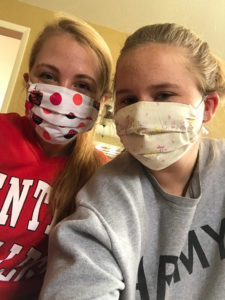
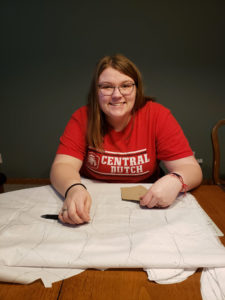











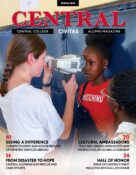
To encourage serious, intellectual discourse on Civitas, please include your first and last name when commenting. Anonymous comments will be removed.
Comments are closed.